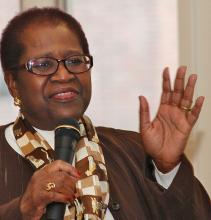Gennifer Brooks began her presentations for the Anabaptist Mennonite Biblical Seminary (AMBS) Theological Lectureship the same way she begins the preaching classes she teachers—with the story in Luke 4 of Jesus reading from Isaiah in the temple.
The homiletics professor at Garrett-Evangelical Theological Seminary, Evanston, Ill., uses that text because it illustrates that a preacher needs the anointing of the Spirit and that the purpose of preaching is to offer good news. The third reason, she added, with laughter from students and professors interrupting her, is that “if you have really, really spoken the way Jesus wants you to speak, they will try to throw you over the top of the hill.”
Brooks focussed her spring lectures on preaching to and from the margins. She called listeners to the difficult identification with people who are devalued and disregarded, and to the challenge of speaking to people whose use of power creates injustice.
“The good news of every sermon must speak of God’s present action in human life that is bringing about a change to the hearers,” she said. “And that change should propel the hearers to action that is representative of Christian discipleship.”
In her lecture on preaching to the margins, the beginning point is to listen, she emphasized. Preachers must immerse themselves in the lives of the people to whom they are preaching. Then, listening to the Holy Spirit, they must “look, listen and learn the biblical story of God’s transforming grace. . . . The biblical text must fit the context of the people’s lives.”
In her second lecture, Brooks looked at the challenge of preaching from the margins to those who have power and privilege. Oppressors “are caught in their own situations of coercion and imprisonment,” she said. “They too must be encouraged to find and claim the freedom that they do not recognize they lack. The preacher is faced with the very difficult task of saying to the rich, ‘You are really poor.’ ”
This must be done in love, she emphasized several times, because love overcomes the evil of oppression. “When one stands with Jesus on the margins, and proclaims justice for the oppressed, regardless of the cause of that oppression, one does so faithfully only from a basis of love.”
Brooks’s third lecture, “With Jesus on the margins,” emphasized helping people recognize the humanity of everyone. “Every preacher’s task is to preach the kingdom of God and call all people to inhabit the kingdom, to have a common and equal identity through Christ.” It is through Christ’s love that preachers can—and must—proclaim justice to the whole world, she concluded.
Brooks holds master of divinity and doctor of ministry degrees from New Brunswick Theological Seminary, and master of philosophy and doctor of philosophy degrees in liturgical studies from Drew University. She is an ordained elder in the United Methodist Church and has served in pastoral roles in rural, suburban, urban and cross-racial settings.
Brooks is editor of Black United Methodists Preach! (Abingdon, 2012) that showcases 14 black United Methodist preachers. She is currently completing Talking with Our Bible Sisters, a daily devotional on the women of the Bible.



Add new comment
Canadian Mennonite invites comments and encourages constructive discussion about our content. Actual full names (first and last) are required. Comments are moderated and may be edited. They will not appear online until approved and will be posted during business hours. Some comments may be reproduced in print.